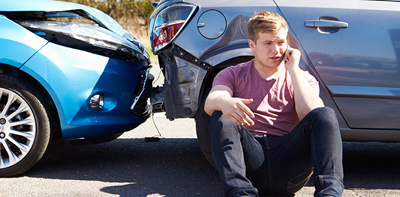
Congratulations, you’ve done the hard bit and passed your driving test.
That’s no small achievement. Figures from the Driver and Vehicle Standards Agency (DVSA) show the average pass rate for the practical test was 47% between April and September 2017.
But now that you’ve passed, here comes the next challenge - finding the right motor insurance. If you drive without it, you’ll not only be breaking the law, but will lose the licence you worked so hard to get.
Unfortunately, 10% of the average salary of drivers aged 18-21 now goes on paying their car insurance bills, according to research from the Association of British Insurers (ABI). This is more than five times the average proportion among all other drivers.
So it’s important to do all you can to find the best deal.
Why do I pay more?
Young drivers face expensive premiums because they’re far more likely to be involved in a car accident than older drivers. According to road safety charity Brake, 23% of 18-24 year olds crash within two years of passing their driving test. Brake says their inexperience means they have less ability to spot hazards, and their youth means they are particularly likely to take risks.
How can I cut car insurance costs?
1. Carefully pick your level of cover
Consider fully comprehensive insurance if you’d struggle to replace your car if it was written off in an accident. This covers your liability to a third party, fire and theft. It also covers damage to your vehicle and a level of personal injury cover for you.
Alternatively, if your car is old and worth little, you could choose third party insurance, which is the minimum insurance you need to drive legally. It covers legal liability to pay damages to someone else (a 'third party') for injury to them, their passengers and their property. If it's your car that's damaged or stolen, you'll have to foot the bill for repairs or a replacement yourself.
Bear in mind individual car insurance policies vary, so always take time to scour the terms and conditions before you buy. And don't assume that 'third party' cover will be cheaper than 'fully comprehensive' as surprisingly that's not necessarily the case. Check out the different car insurance options.
2. Consider telematics
Telematics car insurance policies can help responsible younger drivers to prove they are no riskier than drivers over 25 and enjoy smaller premiums. Your car will be fitted with a small black box which monitors the way that you drive.
You’ll have access to this information, so you can get a profile of your own driving habits and areas where perhaps you need to improve.
3. Fill out your application carefully - and always tell the truth
Making sure your insurance application is as accurate as possible can help keep premiums to a minimum. For example, the number of miles you expect to drive over the course of the year can have a big impact on the cost of your cover – so if you overstate this figure, you could end up having to pay more than necessary.
Other mistakes can be costly too: if you use your vehicle to get to work, this doesn’t mean it needs to be registered for “business use”, for example, which would also normally lead to higher premiums.
4. Drive a car in a low insurance group
As well as age, other facts affecting the price of your insurance include your job, where you live and – one that’s easier to influence – your choice of car.
Insurance companies charge more for vehicles with powerful engines, which they associate with a greater risk of accidents. And adding customisations like alloy wheels might make the vehicle more appealing to thieves – again, upping your insurance costs. Use the Thatcham website to find out which cars are more expensive or cheaper to insure.
Some modifications actually help – an (approved) alarm and immobiliser could shave a few pounds off your policy, as could parking your car off-road overnight (ideally in a locked garage).
5. Minimise your risk
Drive safely and keep your licence clean. If you have no accidents, claims or points on your licence then your premium should fall when you renew your policy.
Cutting your annual mileage will also help reduce your premium.
6. Consider carefully your named drivers
Adding other young and inexperienced drivers to your policy can increase the cost of your car insurance, so keep additional named drivers to a minimum.
If someone else pretends to be the main driver just to reduce premiums, this is a practice known as “fronting”: it’s against insurers’ rules and it can lead to the policy being invalidated as well as, potentially, prosecution for fraud.
7. Take an advanced driving course
One way to prove that you are less of a risk to an insurer than other new drivers is to take an additional driving qualification, such as the Pass Plus.
These courses give you experience in more varied driving conditions, helping improve your abilities at the wheel and hopefully cut the cost of your car insurance.
8. Check up on your insurer
Is a deal you have found online too good to be true? Don’t get scammed. Fake insurers sometimes target young drivers. In fact, men in their 20s are the biggest target for these criminals who sell fake, seemingly cheap, insurance policies to unsuspecting drivers, according to a report published by City of London Police. It provides advice on how to avoid becoming a victim of this type of fraud.
9. Avoid paying in monthly instalments
Generally, you have two options when it comes to paying for your insurance: all up-front or monthly. But as with other services, spreading your payments throughout the year may mean you are charged interest, potentially costing more overall.
10. Pay a higher excess
When you apply for insurance, you can choose how much of any claim you have to pay yourself before your insurer is liable – this excess is typically somewhere between £100 and £400.
The higher you set this excess, however, the lower your premiums will be, as the less money your insurer will have to pay out in the event of an accident.
A final tip: don’t despair – your insurance will get cheaper as you get older and more experienced at driving, as long as you stay safe!

